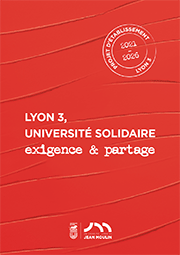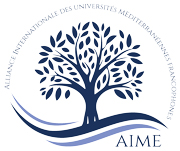AccueilRechercheProgrammes et productions scientifiquesThèsesThèses soutenuesThèses soutenues - 2006-2021Thèses soutenues - 2012
-
Partager cette page
- Recherche,
MICLEA Marius-Sorin
La Roumanie et la Région étendue de la Mer noire, dans le nouveau contexte de sécurité et de défense après la guerre froide.
Publié le 12 juillet 2012 – Mis à jour le 28 ao?t 2012
Thèse en Sécurité internationale et défense soutenue le 29 Juin 2012.
Un nouvel contexte de sécurité en Europe a fait place à l’ère bipolaire au cours des années 1990. La chute du communisme découvre une Europe scindée entre les pays occidentaux et les pays de l’Europe orientale, une région positionnée au carrefour des civilisations, tributaire encore aux défis, dangers et risques qui accompagnent la chute de l’empire soviétique. Au début des années 1990, un nouveau paradigme de sécurité, surnommé le ? paradigme de sécurité gelé ? remplace l’ancien paradigme de la bipolarité, spécifique à la guerre froide. Le manque de coopération entre les pays de la région devient la principale caractéristique de l’époque, au début et lors du moment unipolaire. Le tableau de la sécurité régionale nous montre deux camps avec des conceptions apparemment irrémédiables : d’un part, les pays appartenant à l’ancien système communiste, chacun avec les propres craintes vis-à-vis d’un possible revirement de la Russie et chacun avec une forte orientation pro-occidentale. D’autre part il existe une Russie désireuse de rétablir la sphère d’influence perdue et de regagner la gloire impériale, en utilisant de plus en plus une nouvelle méthode de coercition, l’arme énergétique. Dans cette équation de pouvoir, il est intéressant de poursuivre l’évolution et le r?le de la Roumanie, un pays de faille, appartenant par la langue et par la culture à la civilisation occidentale et par religion à la civilisation orthodoxe. En définitive, par son positionnement stratégique, et par sa volonté de retrouver son identité européenne perdue lors du communisme, la Roumanie deviendra l’une des importants piliers de la défense otaniene dans cette part du continent.
A new security environment in Europe replaced the bipolarity era since the ‘90th. The fall of communism reveals a Europe divided between Western countries and the Eastern Europe, region located at the crossroads of civilizations, tributary to the challenge, risks and hazards accompanying the Soviet collapse. Early ’90th, a new security paradigm, the “paradigm of freeze security” replaces the old one of bipolarity during the Cold War. The lack of cooperation among the countries in the region is the main characteristic of the period, from the beginning and during unipolar moment. The picture of regional security show us two camps having apparently irremediable ideology: on the one hand, countries belonging to the former Soviet empire, each of them having their own concern about a possible sudden change of Russia, but with a strong Western orientation, and on the other hand, the existing Russian empire willing to reestablish a sphere of influence and to regain lost imperial glory, using increasingly a more and new coercion weapon – the energy weapon. In this equation of power, is interesting to observe the evolution and Romania role, a buffer security zone, by the language and culture belonging of Western civilization and by religion of Orthodox civilization. Ultimately, by its strategic position and desire to find again, its European identity, lost during Communism era, Romania will become one of the important pillars of NATO defense, in this part of the continent.
Mots clés : Région étendue de la mer Noire, paradigme de sécurité gelée, chute du communisme, Roumanie, moment unipolaire, monde oligopolaire, politie.
Key words : Wider Black Sea ; fall of communism ; Romania ; paradigm of freeze security; unipolar moment
A new security environment in Europe replaced the bipolarity era since the ‘90th. The fall of communism reveals a Europe divided between Western countries and the Eastern Europe, region located at the crossroads of civilizations, tributary to the challenge, risks and hazards accompanying the Soviet collapse. Early ’90th, a new security paradigm, the “paradigm of freeze security” replaces the old one of bipolarity during the Cold War. The lack of cooperation among the countries in the region is the main characteristic of the period, from the beginning and during unipolar moment. The picture of regional security show us two camps having apparently irremediable ideology: on the one hand, countries belonging to the former Soviet empire, each of them having their own concern about a possible sudden change of Russia, but with a strong Western orientation, and on the other hand, the existing Russian empire willing to reestablish a sphere of influence and to regain lost imperial glory, using increasingly a more and new coercion weapon – the energy weapon. In this equation of power, is interesting to observe the evolution and Romania role, a buffer security zone, by the language and culture belonging of Western civilization and by religion of Orthodox civilization. Ultimately, by its strategic position and desire to find again, its European identity, lost during Communism era, Romania will become one of the important pillars of NATO defense, in this part of the continent.
Mots clés : Région étendue de la mer Noire, paradigme de sécurité gelée, chute du communisme, Roumanie, moment unipolaire, monde oligopolaire, politie.
Key words : Wider Black Sea ; fall of communism ; Romania ; paradigm of freeze security; unipolar moment
Directeur de thèse : Jean-Paul JOUBERT
Membres du jury :
Jean-Paul JOUBERT, Professeur, Université Jean Moulin Lyon 3
Téodor FRUNZETI, Professeur, Université nationale de dérense Carol 1
Adrian IVAN, Professeur, Université Babes Bolyai
Christophe NIDAN, Directeur adjoint de l'Ecole militaire de Paris
Président du jury : Adrian IVAN
Mention : Très honorable avec les félicitations du jury
Equipe d'accueil : CLESID
Documentation
Mise à jour : 28 ao?t 2012







